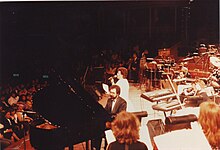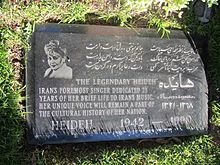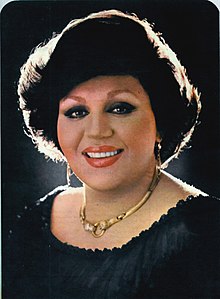|
Hayedeh
Ma'soumeh Dadehbala (Persian: معصومه ددهبالا, romanized: Masume Dadebâlâ; April 10, 1942 – January 20, 1990), known professionally as Hayedeh (Persian: هایده, romanized: Hâyde), was an Iranian singer with a contralto vocal range. Known for her wide range of voice, her career spanned over two decades, and she has been widely described as one of the most popular and influential musicians of Iran.[1][2] Early life and career Ma'soumeh Dadehbala was born on April 10, 1942 in Tehran.[1][3] She was the elder sister of another popular singer Mahasti.[1] Her professional career began in 1968 as a singer on a Persian traditional music program in Radio Tehran called "Golhâye Rangârang" (Persian: گلهای رنگارنگ "Colorful Flowers") directed by Davoud Pirnia. Hayedeh studied Avaz (Persian vocal music) with the Persian violinist and composer Ali Tajvidi. "Azadeh" (1968), which was composed by Ali Tajvidi, with lyrics by Rahi Moayeri, was Hayedeh's first official hit and debut also. It was first performed in 1968 on Radio Tehran with the Gol-ha Orchestra.[3] In this year she released another titled Raftam (1968). In the 1970s, Hayedah added Persian pop music to her classical Persian repertoire. In this period Hayedeh worked with several songwriters, such as Fereydoun Khoshnoud, Jahanbakhsh Pazouki, Anoushiravan Rohani and Mohammad Heydari. "Bezan Tar", "Gol-e Sang", "Nowrouz Aamad", and "Soghati" were among her works during this period.[1] With Mahasti, Hayedeh recorded duets such as "Doa & Delam Mikhad" (I pray and I want) it was successful for release. After the revolution and leaving Iran On August 29, 1978, shortly before the Islamic Revolution in Iran, Hayedeh immigrated to the United Kingdom. She stayed there for three years and moved to the United States in 1982 to continue her singing career. Caltex Records, an Iranian recording label, supported Hayedeh in her career. Hayedeh lived in Los Angeles from 1982 until the end of her life. The area became a hub for the Persian (Iranian) community in Southern California since the 1980s.[1] Hayedeh released many successful albums during this time, and all her songs were bootlegged in Iran. Hayedeh's political and nostalgic songs such as "Rouzaye Roshan", "Ghesseyeh Man", "Zendegi" became very popular with the Iranian exile community.[1] Her songwriters and producers in the United States were mostly Sadegh Nojouki and Mohammad Heydari. Songwriters she worked with were Ardalan Sarfaraz, Homa Mir-Afshar and Bijan Samandar.[citation needed] Songwriter who wrote more than 30 of Hayedeh's songs and hits was her best friend Leila Kasra (a.k.a. Hedieh), who was featured in many of her albums reciting her poems. During her exile, Hayedeh regularly appeared on the Los Angeles-based Persian-language TV channels IRTV, Jaam-E-Jam and Jonbesh TV.[1] Death and burial On January 20, 1990, the day after a performance at the Casablanca Club, near San Francisco, California, Hayedeh died from a heart attack. She was 47 years old. She had a history of diabetes and hypertension. Thousands of fans attended Hayedeh's funeral in Los Angeles. On January 24, 1990, she was buried at the Westwood Village Memorial Park Cemetery in Los Angeles, California. She had been recording an album shortly before her death and was due to finish recording it after she returned from her concert in San Francisco. Every year, her fans honor her memory on her birthday or the anniversary of her death in the virtual space or at her grave. Westwood Village Memorial Park Cemetery management named Hayedeh funeral as one of the largest funerals of the 20th century. On April 10, 2022, at the same time as Haydeh's 80th birthday, her tombstone was changed in the presence of her family and fans.[4] Also, the mayor of Los Angeles praised and thanked her for her years of artistic activities and called her a part of the cultural heritage of the city of Los Angeles. LegacyHayedeh's albums are still best sellers and her songs are played on Persian TV and radio channels outside Iran. Many of her songs are sung by Iranian pop singers. Houshmand Aghili performed Hayedeh's "Sarab", Parviz Rahman Panah remixed her "Saal", Shahla Sarshar performed a tragic song called "In Memory of Hayedeh", singer Amir did a cover of Hayedeh's song "Soghati" in 2008 and Mahasti performed three songs in memory of her late sister.[1]  According to Prof. Erik Nakhjavani in Encyclopædia Iranica: "Analogous to Delkash, before her, Hayedeh sang with technical authority and passionate energy. Her laryngeal control made it possible for her to produce a series of graceful vibrato and glissando vocalizations required by the Avaz Persian vocal music. She could smoothly pass from the upper reaches of her alto voice to the lower, fuller, and darker range of the contralto. This mixture of strong laryngeal strength and learned vocal technique gave her alto-contralto voice a rare, powerful resonance and texture in the performance of the Avaz. Furthermore an acute sense for musical timing, the rhythmic flow of vocal music, affective musical phrasing, and poetic delivery enabled her to express and interpret effectively any songs she sang."[3] Iranian pianist and journalist Pejman Akbarzadeh made a documentary Hayedeh: Legendary Persian Diva about Hayedeh which was screened in Amsterdam in January 2009 for the first time. The documentary had its US premiere in May 2009 at the Noor Iranian Film Festival in Los Angeles and nominated as the Best Documentary at the festival. The film was also screened at 9th International Exile Film Festival (Sweden) and 4th Iranian Film Festival in the Netherlands. Tehran-based FARS News Agency (close to the Islamic Revolutionary Guard) cited the documentary as a film on the "Corrupt monarchist singer Hayedeh". The documentary was released on DVD on 20 January 2010, the 20th anniversary of Hayedeh's death, by "Persian Dutch Network" in Amsterdam.[5] Various American universities have streamed the documentary on their server for educational purposes as well.[6] In April 2019 the Los Angeles City Council recognized and celebrated Hayedeh, one of the most celebrated singers in Persian culture.[7] Partial discographyStudio albums
Compilation
See alsoReferences
External linksWikimedia Commons has media related to Hayedeh.
|
||||||||||||||||||||||
